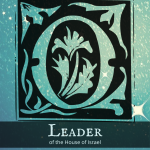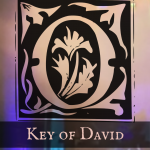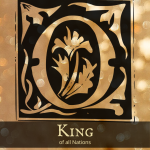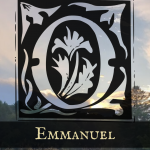Sarah Christmyer's Blog, page 3
January 5, 2024
WHAT’S YOUR [BIBLE] WORD FOR 2024?
What do you want most in the new year?
I’ve been asking myself that for a month. Every thought I’ve had comes down to one word: NEW. 2023 was tough, as I grappled with grief and loss and searched for silver linings. So in 2024, I want a new horizon. A new focus. A new me.
Thank God, any newness in my life comes within the context of his unchanging love. He can and does do new things — but he does not change. I can walk forward in hope, relying on who God is and what he has done in the past and certain that he who has begun a good work in me will bring it to completion in the day of Christ (see Philippians 1:6).
I chose this “Word of the Year” to guide meIn other years, I’ve chosen a word of the year (thank you, Jen Fulwiler!). This year, I decided to choose a Scripture verse instead. I put a handful of possibilities together, then prayed on them. And found myself drawn to this:
My soul … is bowed down within me. But this I call to mind, and therefore I have hope: The steadfast love of the Lord never ceases; his mercies never come to an end; they are new every morning; great is your faithfulness. “The Lord is my portion,” says my soul, “therefore I will hope in him.” The Lord is good to those who wait for him, to the soul who seeks him. It is good that one should wait quietly for the salvation of the Lord. (Lamentations 3:20–26, ESVCE)
 What this verse means to me
What this verse means to meFor context, this is Jeremiah speaking. He’s watching the destruction of Jerusalem. I’d understand if he lost faith in God, as everything went up in smoke. It was a terrible time. But this I call to mind, he says. That’s a big “but”! Regardless of circumstances, he has hope in the steady and never-ending mercy of God that is “new every morning.”
Maybe I can do that too!
This is a powerful passage for meditation and prayer—and memorization, for that matter. To help it come to mind throughout the year. Whatever you’re going through. You can wait quietly, in the situation, knowing that God is faithful and good to those who wait and seek.
Here are some to get you startedThat’s my Word for 2024. Would you like to choose one too? Here is the list I started with (you’ll notice the “new” theme!). Feel free to use it or add your own … and allow the Holy Spirit to guide you as you ponder them.
Proverbs 3:5–8Isaiah 40:1, 28–31Isaiah 43:18–19Jeremiah 29:11–13Lamentations 3:20–26Zephaniah 3:172 Corinthians 5:17–20Revelation 21:3–5
Let me know what you choose and how you fare! Either here in the comments or on Instagram, @comeintotheword.
May God bless you richly with his Word this year!
© 2024 Sarah Christmyer
The post WHAT’S YOUR [BIBLE] WORD FOR 2024? appeared first on Come Into The Word with Sarah Christmyer | Bible Study | Lectio Divina | Journals | Retreat.
READ THE BIBLE EVERY DAY THIS YEAR
How would your life be different if you read the Bible every day — or if you turned to it as often as you do your smartphone?
Pope Francis asked that question and had this to say:
“If we had the Word of God always in the heart, no temptation would be able to estrange us from God and no obstacle would be able to make us deviate from the path of goodness; we would be able to overcome the daily suggestions of evil that are in us and outside of us; we would be more capable of living a resurrected life according to the Spirit, receiving and loving our brothers … and also our enemies” (3/6/17 Angelus address in St Peter’s Square).

Maybe it’s too much to expect, that we check our Bibles as often as we check our cellphones. But think of the strength and confidence we might gain by reading a little bit every day! I mean really reading it. Taking a small piece and thinking, meditating, “chewing” on it until it takes up residence in our mind and heart. Because once that happens, the word of God takes on a life of its own and starts to change us.
Resolve to read the Bible daily in 2024That’s why this year, I plan to read the Bible every day. Will you join me? It doesn’t have to be hard. Here are some ideas if you don’t know where to start:
Grab a lectionary (or go to the USCCB website) and read the day’s gospel reading every day for a year.Read a Psalm a day. When you’re done, start back at the beginning. After that, zero in on your favorites. Or read all of them each month by reading five each day. You can also cycle through by praying the Liturgy of the Hours.Start with Matthew 1 and make your way through the New Testament. Take your time, even if it’s just a few sentences a day. Let it soak in. Listen and pray with it.I once spent an entire school year reading a chapter of Proverbs a day. There are 31 chapters, so it’s easy to match the chapter to the day of the month.Don’t be afraid to repeat something good over and over. You might even memorize a book that way, without trying. Think what God could do in your soul with that level of saturation….Follow one of the reading plans in the Living the Word Catholic Women’s Bible. There are lots of reading helps in that Bible, too.Start the year out with the Bible Timeline 90-day reading plan. It’ll take you through the entire biblical narrative (14 books that tell the overall story) in three months. When you’re done, go back and spend leisurely, prayerful time in the books that spoke the most to you.Read through that same set of Bible Timeline readings in a year instead of three months by reading just a chapter a day. Use this check-off list or read with the help of the Bible Timeline Guided Journal .Find some other ideas on the Resources page of my website.
What do I plan to do? Along with praying with the lectionary readings every day, I’m going to soak in Mark’s gospel — which is the focus of this year’s Sunday mass readings. What will you decide?
If you need help getting started, this post will give you three “Ps” to help you build a Bible reading habit:
BUILD A BIBLE READING HABIT (3 “Ps” to Get You Started)
2024 – ready or not, here I come!Share your plan in the comments, if you’d like. I’d love to hear it. And may the Lord richly bless you as you read!
© 2013 – 2024 Sarah Christmyer (Previously published as “Start the New Year Right: Build a Bible Reading Habit,” 2019)
The post READ THE BIBLE EVERY DAY THIS YEAR appeared first on Come Into The Word with Sarah Christmyer | Bible Study | Lectio Divina | Journals | Retreat.
February 27, 2023
PSALMS FOR LENT: Find GRACE in the Penitential Psalms
The Psalms are unique in the Bible because on one hand, they are prayers of people pouring out their hearts to God; but at the same time, they are the words of God. When we pray with them, our thirst for him meets his thirst for us. The psalms reveal HIS heart while they bare OUR hearts. They connect with us in our humanity – our weakness, longing, hurts, joys, praise – and lift our eyes and hearts to the One all those emotions are meant to point us to.
How do they do this? By giving us words to pray that (when we pray them) help form us in knowing how to pray. St. Augustine recommended that we intentionally learn to use the words of the psalms in our conversation with God. In places where what we read doesn’t express our own thoughts and emotions, he said, we can use them to express the praise and pain of people we’re praying for. Augustine said that by giving him true language to pray with, the psalms set his faith on fire and gave him a voice. They taught him the prayer of his own heart.
I love that! Who doesn’t want better words to pray with; to express what we’re really feeling in our heart? Who doesn’t want their faith set on fire?! Did you have any idea that praying with Scripture could do that for you?
Seven Psalms help us return to GodI’m soaking in the Penitential Psalms this Lent, sharing weekly with the Mother & Home online community. One woman told how after praying with Psalm 6 for days (which is what we are doing, to help the scripture sink in), it went from meaning nothing to her, to bringing a powerful message: that assurance comes less from repeated petition than it does from repeatedly seeking God’s presence; from returning to him again and again and choosing to trust the Lord who hears and accepts our prayer (vs. 9).
Similarly, meditating on the Penitential Psalms as I do in Lent has planted in my heart a longing to experience God’s mercy and love in a deeper way. Not a wistful longing for something that will never be, but a longing full of HOPE because I know he’s there.
So, what are the Penitential Psalms?In a nutshell, they are seven psalms that help us recognize our sin, offer up our sorrow, and ask God’s forgiveness. In order, they are Psalms 6, 32[31], 38[37], 51[50], 102[101], 130[129], and 143[142]. At one time, it was obligatory to pray them during Lent. Even now, it’s common to pray them either daily or on Fridays. I first thought that was morbid, or depressing—and then I tried it. I found it so enriching, I now pray with them in some way every Lent.
HINT: Watch in these—and all—psalms for the phrase “steadfast love” or, depending on the translation, “loving kindness.” The Hebrew is hesed: the deep, faithful love of a father. At times it shows as “tough love,” when that’s best for us. But it is always available with his mercy.
Here’s one way I look at them, in light of the word GRACE:
G: Give up (Psalm 6)We begin by emptying ourselves so the Lord can shine a light on our hearts and we can be more aware of our need.
R: Repent (Psalms 32, 38)Next in true sorrow, we throw ourselves on God’s mercy and love and repent of our sin.
A: Adore (Psalms 51, 102)Then we adore God, as we long for his purity and our end in heaven.
C: Confidence (Psalm 130)We grow in confidence as we’re confirmed in our trust in the divine mercy.
E: Exult (Psalm 143)Having returned to the Lord, having been received with love and forgiven, we exult in joy!
Find GRACE in these Psalms as you continue your Lenten journeyI encourage you to reflect on the Penitential Psalms many times during Lent. Maybe as you sit before the Lord in adoration, before you go to confession, or in your daily prayers. And may your heart open wide to the graces Christ has for you!
© 2023 Sarah Christmyer
Here’s a free download to show you how (this also explains how to pray with them for intentions related to the seven deadly sins):Use this simple journal to find inspiration and to track your progressIt’s not too late to join the conversation at Mother & Home! Sign up here.
From According to Your Mercy by Martin Shannon.
The post PSALMS FOR LENT: Find GRACE in the Penitential Psalms appeared first on Come Into The Word with Sarah Christmyer | Bible Study | Lectio Divina | Journals | Retreat.
February 20, 2023
ADD SCRIPTURE TO YOUR LENTEN DIET
How about adding something to your Lenten diet this year, in place of the things you abstain from?
I’m not talking about adding food. As Jesus famously said, we don’t live just on bread, but on “every word” that comes from God (see Matthew 4:4). Lent is a great time to see the truth of that, by making it intentional.

Pope Francis had an interesting comment on Jesus’s parable of the rich man who ignored Lazarus, the poor beggar who lay dying at his gate (see Luke 16) . He said that the root of the rich man’s problem was not his wealth but his failure to pay attention to God’s word. The man was so caught up in his own pursuits, he didn’t listen to the word that he heard. And that set off a chain reaction. His love of God grew cold. He stopped noticing his needy neighbor and eventually grew to despise him.
I wonder how often that happens to us. We’re good people, we go to church, we take care of our families, we volunteer — but all those good things start to overcome our inner lives. We carve out precious time to relax: to play golf, or exercise, or see a movie. But there’s no time to sit with the Scriptures, to really listen to God speak into our hearts and transform us. How long before our own love will grow cold, like the rich man’s in the parable?
“The Word is a gift,” Pope Francis reminds us. “The word of God is alive and powerful, capable of converting hearts and leading them back to God.”How can we open our heart to this gift, especially at Lent, which calls us in a special way to a fresh start?
Set aside a daily time to consume the WordOne way is to set aside 10-30 minutes a day for each of the 40 days of Lent to read and meditate on Scripture. You probably already have a 10-minute habit you rarely miss. Maybe you read the paper or solve the Wordle puzzle before you go to work. Or you scroll through your Instagram feed during lunch, or channel-surf before turning in for the night. What daily habit can you give up for Lent instead of coffee or sweets, and replace it with time in the word of God?
In my experience, one of the biggest obstacles to starting to read the Bible is the lack of a plan. With that in mind, here are three simple suggestions to get you started. Perhaps one will inspire you to spend 40 days in the Word and allow it to feed your soul.
1. Focus on the readings you hear at MassRead along with the Church and meditate on the Ash Wednesday and Sunday readings throughout the following week. Download 40 Days in th40 Days in the Bible-Yr A_2017,20…e Bible, my free Monday-Friday reading plan for the Lent and Easter Seasons, Year A.
2. Read through one of the GospelsTake a slow journey through the Gospel of Matthew. Here is a daily Lenten reading plan that takes you through Jesus’s life and ministry and into his passion, death, and resurrection just as we are celebrating those things as a Church. To journal as you go, record the date and passage read along with your observations, questions, what it means to your life and how you respond to God. Download the Reading Checklist here.
3. Follow this Lent-themed reading planDaily readings in this plan from the Living the Word Catholic Women’s Bible are grouped under weekly themes like “We are dust” and “in the Wilderness,” “Toward hope,” and “Called to die” — taking you on a scriptural tour from Ash Wednesday through Easter Sunday. Download the pdf here, or order the Bible here (use the code WORDOFGOD22 through the end of February $5 off and free shipping).
4. Meditate on the Penitential PsalmsFollow the tried-and-true practice of reading the seven Penitential Psalms. My Lenten journal, Create in Me a Clean Heart: Ten Minutes a Day in the Penitential Psalms will guide you through a daily prayerful meditation on one of these psalms a week from Ash Wednesday to Easter. Available from Amazon.
Read more about praying with the Penitential Psalms, and find more resources to help you, here.
Whatever you choose to do, I’d love to hear how it goes!
Blessings on you as you read His word.
©2023 Sarah Christmyer; revised from “40 Days in the Word: Add Scripture to your lenten diet,” published February 22, 2017.
The post ADD SCRIPTURE TO YOUR LENTEN DIET appeared first on Come Into The Word with Sarah Christmyer | Bible Study | Lectio Divina | Journals | Retreat.
January 12, 2023
TRUST IN GOD; HE’S GOT YOUR BACK
Israel was between a rock and a hard place. Literally.
There they were, camped on the plains of Moab. With solid cliffs behind them and the River Jordan and Jericho ahead, barring their way into Canaan.

They were also caught between the “rock” of their sin and the hard job of conquering the land God has promised them. God had freed them from slavery and made them his own. They had exchanged mutual vows of fidelity and love at Mt. Sinai. And then, as God prepared to carry them over the threshold of their new home, they cheated on him. Forgetting God, they consecrated themselves to the god of that place, the Baal of Peor (Numbers 25; see too Hosea 9:10).
The dangerous freedom of choiceGod sent a plague and destroyed the offenders. With that fresh in the minds of those who remained, Moses pointed across the Jordan. There are two ways this can go, he says. You can follow God and live, or stick with these other gods and die. It’s your choice to make (see Deut 30:11+). The rock, or the hard place.
Moses was in a hard place, too. His job—and his life—was nearly done. He would not join the people as they crossed into Canaan. He had done his best, leading and encouraging and reminding and warning the people. But before he gave his final blessing, God broke the bad news (Deut 31): I will lead them into the land, but they will not follow me. In fact, they’re already planning to rebel. So write this song and teach it to them.
Moses’s song hits homeThat Song of Moses in Deuteronomy 32 is a magnificent, last-ditch plea to the people to take what he says to heart, because their lives are at stake! And the song comes to life when you read it in that geographic and historical context.
Put yourself, for a moment, on the Plains of Moab. Stand there, with the cliffs to your back. Looming above is Beth Peor, “House of Peor.” The house of the god they chose over YHWH.

READ ABOUT THE SONG OF MOSES HERE
Moses desperately wanted to make their choice clear. Inspired no doubt by the massive cliff that lay behind them, he gave God a new name:
Listen! He tells them; I will proclaim the name of the LORD: The Rock, his work is perfect….
“The Rock.” There are other Hebrew words for “rock,” but Moses used tsur. It’s not a rock you can lift and move or even roll. Tsur is a strong and mighty cliff. A refuge but also a precipitous edge. God is a rock of refuge and at the same time he’s a cliff against which his enemies are dashed or from which people fall, by their sin.
God is a Rock to take seriouslyTsur is the rock at Horeb that Moses strikes to bring water in the desert (Ex 17:6). It’s the rock from whose cleft Moses sees the glory of God (Ex 33:22). And tsur is that cliff above the Plains of Moab (Num 23:9).
Read Deuteronomy 32 and notice how Moses uses tsur as a proper name for YHWH. In our Bibles, it is capitalized when used that way, then put in lower case for other gods. See how Moses compares them in verse 31 and other places. What are the attributes of The Rock, our God? How do the wanna-be rocks measure up?
Now take this Word to heartSpend time in Deuteronomy 32, then think about it.
What god is a “rock” in your life?Where do you turn when you’re troubled … or longing … or discouraged, or lost?When you’re between trusting a rock and a hard place—caught between The Rock and the “rocks” of the world—which will you choose?Will you lean on a rock, or has The Rock got your back?Make this Psalm your prayer today:
I love thee, O Lord, my strength.
The Lord is my rock, and my fortress, and my deliverer,
my God, my rock*
, in whom I take refuge,
my shield, and the horn of my salvation, my stronghold.
I call upon the Lord, who is worthy to be praised,
and I am saved from my enemies. […]
For who is God, but the Lord?
And who is a rock*
, except our God?—
the God who girded me with strength,
and made my way safe.
He made my feet like hinds’ feet,
and set me secure on the heights.
(Psalm 18:1–3, 31–33)
* tsur
© Sarah Christmyer 2023
You might also like:Our God is a Rock!He will set me upon a rockFinding refuge in the Psalms — Psalm 46 and 146
The post TRUST IN GOD; HE’S GOT YOUR BACK appeared first on Come Into The Word with Sarah Christmyer | Bible Study | Lectio Divina | Journals | Retreat.
December 23, 2022
FINDING JOY AT CHRISTMAS
“Awake, mankind! For your sake God has become man…I tell you again: for your sake, God became man.” —Saint Augustine
As we move into Christmas, I wish for you the peace and joy that only Jesus brings. Whether you are prepared or not; whether you are well or not; whether you can afford gifts or not; whether you can be with those you love or not …
… take time to set your sights on the thing that really matters.

Maybe sit beside a nativity scene or where you can see a Holy Family ornament on your tree. Meditate on Luke’s account of Jesus’ birth in Lk 2:1–20. And notice:
Mary and Joseph were away from home and had nowhere to stay—yet Jesus came to themThe shepherds were on night duty—but an angel brought the news to them, special delivery (and they were treated to a heavenly concert, to boot!)The shepherds were afraid—yet that fear was swallowed up in joyMary and Joseph had nowhere but a manger for the child—and it did not make a difference
It’s easy to allow circumstance to mar our joy. But maybe, if you’re swamped by obligations or displaced or having trouble paying rent, let alone for gifts and decorations (or even if you have those things)—maybe it will help to remember:
This is why Jesus came, and how.
“For your sake God has become man…I tell you again: for your sake, God became man.”
For your sake he came poor and helpless. For your sake he braved a callous, dangerous world. For your sake he did without the lovely home, the beautiful decorations, the feasting. Jesus gets it. He has been where you are. Mary and Joseph get it. To their nothing-ness, came God. And angels sang and simple shepherds brought good news, and joy.
This Christmas, may you be surrounded by angels and filled with songs of joy, knowing with what love God comes to be with you, right where you are.
Rejoice in the Lord always; again I will say, Rejoice! For the Lord is at hand. And may the peace of God, which passes all understanding, keep your hearts and your minds in Christ Jesus. (See Philippians 4:4–7)
© 2022 Sarah Christmyer
The post FINDING JOY AT CHRISTMAS appeared first on Come Into The Word with Sarah Christmyer | Bible Study | Lectio Divina | Journals | Retreat.
December 18, 2022
FOCUSING ON THE CHRIST CHILD with the O Antiphons
Having recently lost someone dear to me has shifted my focus to beyond the grave, where I imagine him filled with the peace and joy he longed for. It increases my own longing for heaven, too, although I hope to stick around for a good long time! Thankfully we don’t have to wait for eternity, to be with the Lord.
Jesus comes here, right where we are, to be with us.
I’m listening to O Come, O Come Immanuel a lot these days, especially to the soaring, achingly beautiful violin and piano instrumental version from Casting Crowns.
I know the lyrics well enough that my subconscious fills them in while I enter the music and let it lift my heart. Each verse is based on one of the “O Antiphons” that frame Mary’s Magnificat canticle at vespers from December 17 – 23.
If you let them, the O Antiphons can work like a liturgical reset button. Whether your days from now to Christmas are hectic and crowded, or lonely, or pulsing with joy, praying with these short phrases can gather up your emotions and point them toward the Christ child. Like a last-minute countdown, they cry out for Jesus to come with his mercy and love—each night using a different name that reflects both Old Testament longing and our hopes today.
It’s worth taking time to savor these antiphons each day, even if you don’t pray vespers. You might say them with the Magnificat before you go to sleep. Or sing O Come, O Come Emmanuel with your family at dinner: each verse describes one of the antiphons. Or take a few minutes in the morning to read the antiphon* and meditate on one of these Scripture passages that reflect its meaning:
December 17 O WISDOM OF OUR GOD MOST HIGH,
O WISDOM OF OUR GOD MOST HIGH,GUIDING CREATION WITH POWER AND LOVE:
COME TO TEACH US THE PATH OF KNOWLEDGE!
If any of you lacks wisdom, let him ask God, who gives to all men generously and without reproaching, and it will be given him. (James 1:5)
The law of the LORD is perfect,
reviving the soul;
the testimony of the LORD is sure,
making wise the simple;
the precepts of the LORD are right,
rejoicing the heart;
the commandment of the LORD is pure,
enlightening the eyes;
the fear of the LORD is clean,
enduring for ever;
the ordinances of the LORD are true,
and righteous altogether.
More to be desired are they than gold,
even much fine gold;
sweeter also than honey
and drippings of the honeycomb.
(Psalm 19:7-10)
 O LEADER OF THE HOUSE OF ISRAEL,
O LEADER OF THE HOUSE OF ISRAEL,GIVER OF THE LAW TO MOSES ON SINAI:
COME TO RESCUE US WITH YOUR MIGHTY POWER!
No temptation has overtaken you that is not common to man. God is faithful, and he will not let you be tempted beyond your strength, but with the temptation will also provide the way of escape, that you may be able to endure it. (1 Cor 10:13)
Fear not, for I am with you, be not dismayed, for I am your God; I will strengthen you, I will help you, I will uphold you with my victorious right hand. (Isaiah 41:10)
December 19 O ROOT OF JESSE’S STEM,
O ROOT OF JESSE’S STEM,SIGN OF GOD’S LOVE FOR ALL HIS PEOPLE:
COME TO SAVE US WITHOUT DELAY!
There shall come forth a shoot from the stump of Jesse,
and a branch shall grow out of his roots.
And the Spirit of the LORD shall rest upon him,
the spirit of wisdom and understanding,
the spirit of counsel and might,
the spirit of knowledge and the fear of the LORD.[b]
And his delight shall be in the fear of the LORD.
He shall not judge by what his eyes see,
or decide by what his ears hear;
but with righteousness he shall judge the poor,
and decide with equity for the meek of the earth. (Isaiah 11:1-4)
 O KEY OF DAVID,
O KEY OF DAVID,OPENING THE GATES OF GOD’S ETERNAL KINGDOM:
COME AND FREE THE PRISONERS OF DARKNESS!
For to us a child is born,
to us a son is given;
and the government will be upon his shoulder,
and his name will be called
“Wonderful Counselor, Mighty God,
Everlasting Father, Prince of Peace.”[c]
Of the increase of his government and of peace
there will be no end,
upon the throne of David, and over his kingdom,
to establish it, and to uphold it
with justice and with righteousness
from this time forth and for evermore.
The zeal of the LORD of hosts will do this. (Isaiah 9:6-7)
 O RADIANT DAWN,
O RADIANT DAWN,SPLENDOR OF ETERNAL LIGHT, SUN OF JUSTICE:
COME AND SHINE ON THOSE WHO DWELL IN DARKNESS AND IN THE SHADOW OF DEATH.
The people who sat in darkness have seen a great light, and for those who sat in the region and shadow of death light has dawned. (Matthew 4:16)
Again Jesus spoke to them, saying, “I am the light of the world; he who follows me will not walk in darkness, but will have the light of life.” (John 8:12)
December 22 O KING OF ALL NATIONS AND KEYSTONE OF THE CHURCH:
O KING OF ALL NATIONS AND KEYSTONE OF THE CHURCH:COME AND SAVE MAN, WHOM YOU FORMED FROM THE DUST!
And he came and preached peace to you who were far off and peace to those who were near; for through him we both have access in one Spirit to the Father. So then you are no longer strangers and sojourners, but you are fellow citizens with the saints and members of the household of God, built upon the foundation of the apostles and prophets, Christ Jesus himself being the cornerstone, in whom the whole structure is joined together and grows into a holy temple in the Lord; in whom you also are built into it for a dwelling place of God in the Spirit. (Ephesians 2:17-22)
December 23 O EMMANUEL, OUR KING AND GIVER OF LAW:
O EMMANUEL, OUR KING AND GIVER OF LAW:COME TO SAVE US, LORD OUR GOD!
Then I saw a new heaven and a new earth; for the first heaven and the first earth had passed away, and the sea was no more.[a] 2 And I saw the holy city, new Jerusalem, coming down out of heaven from God, prepared as a bride adorned for her husband; 3 and I heard a great voice from the throne saying, “Behold, the dwelling of God is with men. He will dwell with them, and they shall be his people,[b] and God himself will be with them;[c] 4 he will wipe away every tear from their eyes, and death shall be no more, neither shall there be mourning nor crying nor pain any more, for the former things have passed away.”
And he who sat upon the throne said, “Behold, I make all things new.” (Revelation 21:3-5)
Come, Lord Jesus!
© 2022 Sarah Christmyer
* Traditional O Antiphons cited here are from Catholic Blessings and Prayers as quoted on usccb.org.)
+ + + + + + +
This post is modified from one that appeared here on 12/17/2018 as Is He Here Yet? Calling for Jesus with the O Antiphons.
The post FOCUSING ON THE CHRIST CHILD with the O Antiphons appeared first on Come Into The Word with Sarah Christmyer | Bible Study | Lectio Divina | Journals | Retreat.
November 23, 2022
THANKSGIVING PSALMS: Drowning grief in gratitude
Thanksgiving Day rolls around regardless of events, and some years it’s easier to get in the spirit than others. This is one of the hard ones. Mark died just four weeks ago, and there’s been barely time to grieve. I am prepared to give thanks for his life; for 35 years of marriage and all that came from them; for Mark’s witness to God’s faithful care even in his suffering. But he is not here, my heart cries, and I am. Don’t expect me to be thankful now!
How can I be thankful when I’m sad?I’m not feeling grateful. But St. Paul tells us,
“Rejoice always, pray constantly, give thanks in all circumstances; for this is the will of God in Christ Jesus for you” (1 Thessalonians 5:16–18, emphases mine).
Really? That’s the will of God?
I know he means the giving thanks and not the circumstances. But I need help with that, and turn to the Psalms.

Psalm 137 resonates with me today. It meets me where I am. It’s the one “by the waters of Babylon,” where the exiled people of Israel weep as they think of Jerusalem, which has been destroyed. Their captors demand that they laugh and sing. “How shall we sing?” they ask in torment (vs. 4). They will never forget the city they love!
The psalmist ends in rage against their enemies. It’s not a place I want to go in my heart, however much I can identify. But I can’t help noticing the psalm’s placement in the Bible.
…between two psalms that help to set me straightPsalm 137 is sandwiched between 136, the “Great Hallel” psalm that calls us to thank God for his goodness and mercy which permeate all of history, even times of distress; and 138, which might be the psalmist’s personal response to that summons. Repeatedly he gives thanks to the Lord, who sustains him “though I walk in the midst of trouble” (vs. 7).
If you, like me, seek to drown your grief in gratitude this week, I recommend these Psalms. Read them in your Bible (not on the internet) so you can more easily see the flow between them.
Start with 136 and its call to praise, noting the reasons given.Continue with 137 and allow yourself to feel the pain … and then continue on:Read 138 slowly several times. Notice that the author’s thanks doesn’t start with his own feeling. Rather, it’s rooted in truths about God. This thanksgiving isn’t a gush of emotion, it’s a deliberate, overt proclamation. List the things the psalmist is grateful for; the reasons he gives for giving thanks; the benefits to his relationship with God. Read again and listen. What touches your heart? How?Notice how both the psalmist in 138, and Paul in 1 Thessalonians 5, end at the same place: with God’s faithfulness to those he loves. He will be faithful to you! Resolve to give thanks even as you walk in the midst of trouble. Thank God for who he is and all he’s done and promised. Plunge your grief into the ocean of his love and let it console you.
© 2022 Sarah Christmyer
+ + + + + + +
Continue meditating on these thanksgiving Psalms and prayer:
Psalm 100Psalm 107Psalm 118The Te Deum (read it and learn more here)You might also like these:
Thanks-Giving: the Door to Happy Holidays (when grudges threaten family gatherings)Giving Thanks in Good Times and in Bad (the extraordinary example of the Jews)Practicing Gratitude — Grace Before Meals (more on 1 Thessalonians 5:18)Thanks (for Nothing?) Learn the Power of Praise (thanksgiving as a sacrifice)
The post THANKSGIVING PSALMS: Drowning grief in gratitude appeared first on Come Into The Word with Sarah Christmyer | Bible Study | Lectio Divina | Journals | Retreat.
June 17, 2022
YOU CAN’T TAKE IT WITH YOU: How to fill your heavenly “handbag”
Our house was broken into by thieves. Their target was our copper pipes, but they also nabbed a brass mallard, some sweet little Nikon binoculars, and a blanket of which I was inordinately fond. It could have been worse. They could have taken much more, and trashed the place, but they did not.
This comes to mind as I read the Sermon on the Mount. Jesus told his disciples not to store up treasures on earth but in heaven, “where thieves do not break in and steal. For where your treasure is, there will your heart be also” (see Matthew 6:19–21).

Where is my treasure? There is an ache in my heart when I think of the things that were taken, particularly that blanket. It leaves a hole that cries out to be filled. But with what?
More possessions that can be stolen or moth-eaten or rusted away?More or better investments?What about less tangible treasures like prestige or power?More books published, or a bigger social media following?Health or beauty or nice clothes?
And when death steals all these things from me, will my heart be just a gaping hole?
How full is your “heavenly handbag”?Every time I see our empty blanket chest, the ache reminds me: “lay up treasure in heaven.” Better to stock my heavenly treasure chest—or as Pope Francis called it, the “handbag of heaven.”
In Luke 12, Jesus tells the disciples to sell their possessions, give alms, and focus on filling “purses that do not grow old.” We don’t need to be afraid for ourselves, he says, because it’s God’s good pleasure to give us the kingdom! (see vss. 32–34). In God’s economy, it’s those who give who receive: “give, and it will be given to you; good measure, pressed down, shaken together, running over, will be put into your lap” (Luke 6:38).

What I love about both of these passages (Matthew 6 and Luke 12) is the reason Jesus gives to store treasure in heaven: so that our hearts will be there, too. We can guard against aching hearts by giving away and holding lightly earthly things, and amassing the kind of treasure that lasts forever.
In the end, the treasure that lasts turns out to be the same treasure that really satisfies our hearts. The investment that truly pays is knowing and loving Jesus and the things he loves: Holiness. Mercy. Truth. Justice. Charity. It is in loving others—even those we don’t like, even enemies—as he does. It is in giving our things and our selves up for him, investing time in people before profit.
It’s worth thinking about: What’s in your wallet?
+ + + + + + +
“Why do you spend your money for that which is not bread,
and your labor for that which does not satisfy?
Listen diligently to me, and eat what is good,
and delight yourselves in rich food.”
—Isaiah 55:2, ESV
+ + + + + + +
©2022 Sarah Christmyer
The post YOU CAN’T TAKE IT WITH YOU: How to fill your heavenly “handbag” appeared first on Come Into The Word with Sarah Christmyer | Bible Study | Lectio Divina | Journals | Retreat.
March 5, 2022
RETURNING TO GOD…AND PRAYERS FOR UKRAINE
My heart is breaking over events in Ukraine. As I continue to meditate on the readings from Ash Wednesday, I’m drawn over and over to Joel 2:12–13—
“Yet even now,” says the Lord,
“return to me with all your heart,
with fasting, with weeping, and with mourning…”
Joel is crying to a people crushed by an invader the way Ukraine is being crushed by Russia. Read this little book, and weep with them. Weep at the horror; then lift your head at the hope.
Lord, have mercyJoel’s three chapters are full of terror but also of comfort and triumph. Evil brings unbearable anguish into the world. Sometimes we call trouble on ourselves because of personal sin; and even when we are innocent, sin is at the root. BUT the Lord will judge. His judgment may shake the world “but the Lord is a refuge to his people” (3:16).
“Yet even now,” says the Lord, …
Return to the Lord, your God,
for he is gracious and merciful,
slow to anger, and abounding in steadfast love.
“Yet even now.” Even in the middle of the chaos. Even when it might seem as though it’s too late. While there is breath, there is still hope and God never stops calling us to return to him.

Candles in St Peter in Gallicantu, Jerusalem, not far from a pit where Jesus may have been held the night of his arrest. Photo by Sarah Christmyer.
Reading this now, at the start of Lent and with the news that gets worse by the hour, I’m reminded that we all are connected. World peace isn’t just somebody else’s problem. World peace begins with personal conversion; it begins in my heart and yours. And each of those Ash Wednesday readings contains an urgent personal cry (emphases mine):
The first reading:“Yet even now,” says the Lord, “return to me … and rend your hearts” (Joel 2:12,13)
The second reading:“We beseech you on behalf of Christ, be reconciled to God […] Behold, now is the acceptable time; behold, now is the day of salvation.” (2 Cor 5:20, 6:2)
The verse before the gospel:“If today you hear his voice, harden not your hearts” (Psalm 95:7-8)
After that buildup, the gospel (Matthew 6:1–6, 16–18) gets down to the business of how to approach this God who is both terrifying in power and extraordinarily kind and merciful. Quietly, without fanfare so only God knows,
Fast: empty yourself of all that stands between you and God so there’s room for him inside.Pray: reach out to the Lord and share your heart; give him praise and thanks; tune your ears to listen. Allow him to speak into your life and fill you with himself.Give: of all that you’ve been given. Allow God’s abundance to overflow to others.The need to returnWe can’t do it unless we first return to God. Which is why Psalm 51, David’s beautiful penitential psalm, takes center stage as our response to God:
Have mercy on me, O God, in your goodness;
in the greatness of your compassion wipe out my offense.
Thoroughly wash me from my guilt
and of my sin cleanse me.
R. Be merciful, O Lord, for we have sinned.
For I acknowledge my offense,
and my sin is before me always:
“Against you only have I sinned,
and done what is evil in your sight.”
R. Be merciful, O Lord, for we have sinned.
A clean heart create for me, O God,
and a steadfast spirit renew within me.
Cast me not out from your presence,
and your Holy Spirit take not from me.
R. Be merciful, O Lord, for we have sinned.
Give me back the joy of your salvation,
and a willing spirit sustain in me.
O Lord, open my lips
and my mouth shall proclaim your praise.
R. Be merciful, O Lord, for we have sinned.
Notice that although the psalm itself is the cry of an individual, when we sing it at Mass, our response is collective. “Be merciful, O Lord, for we have sinned.” During Lent, we can pray this for ourselves as we repent and we can pray it, joined to Christians around the globe, for the sins of the world.
Even now, says the LORD,
return to me with your whole heart,
with fasting, and weeping, and mourning;
Rend your hearts, not your garments,
and return to the LORD, your God.
For gracious and merciful is he….
Lord, have mercy on Ukraine.
R. Be merciful, O Lord, for we have sinned.
Lord, have mercy on Russia.
R. Be merciful, O Lord, for we have sinned.
Lord, have mercy on us all.
R. Be merciful, O Lord, for we have sinned.
© 2022 Sarah Christmyer
Continue this reflection by praying with me with Psalm 51, in this 10-minute audio:
https://comeintotheword.com/wp-content/uploads/2022/03/Ash-Wed22_Psa51.m4a.
To reflect on the Sunday readings with my Lenten reading plan, download directions here. You can read about it in last week’s blog post:
Another way to pray this Lent is with the Penitential Psalms. Download instructions here or use my guided journal, “Create in Me a Clean Heart: Ten Minutes a Day with the Penitential Psalms.”
The post RETURNING TO GOD…AND PRAYERS FOR UKRAINE appeared first on Come Into The Word with Sarah Christmyer | Bible Study | Lectio Divina | Journals | Retreat.








